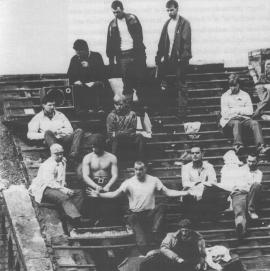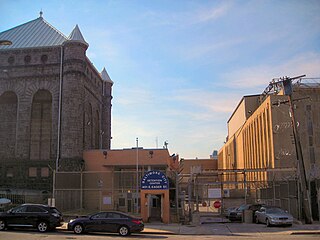
HM Prison Pentonville is an English Category B men's prison, operated by His Majesty's Prison Service. Pentonville Prison is not in Pentonville, but is located further north, on the Caledonian Road in the Barnsbury area of the London Borough of Islington, north London. In 2015 the justice secretary, Michael Gove, described Pentonville as "the most dramatic example of failure" within the prisons estate.
A federal prison is operated under the jurisdiction of a federal government as opposed to a state or provincial body. Federal prisons are used for convicts who violated federal law, inmates considered dangerous (Brazil), or those sentenced to longer terms of imprisonment (Canada). Not all federated countries have a legal concept of "federal prison".

Incarceration in the United States is one of the primary means of punishment, penal labor and rehabilitation, for the commission of crimes or other offenses. Prison terms are typically reserved for those found guilty of more serious crimes, defined as felonies by state and federal legislatures. Over five million people are under supervision by the criminal legal system. Nearly two million people are incarcerated in state or federal prisons and local jails, 2.9 million people are on probation, and over 800,000 people are on parole. At year-end 2021, 1,000,000 people were incarcerated in state prisons; 157,000 people were incarcerated in federal prisons; and, 636,000 people were incarcerated in local jails. By year-end 2021, the U.S. prison population had declined 25% since reaching its peak in 2009. The nearly 1.2 million people imprisoned in 2021 were nearly six times the prison population 50 years ago, before the prison population began its dramatic growth.

HM Prison Manchester is a Category A and B men's prison in Manchester, England, operated by His Majesty's Prison Service. It is still commonly referred to as Strangeways, which was its former official name derived from the area in which it is located, until it was rebuilt following a major riot in 1990.
Prisons in Hong Kong are correctional facilities in Hong Kong, which are managed by the Correctional Services Department. Facilities have different purposes. Hong Kong has one of the highest rates of imprisonment in the region.

Mountjoy Prison, founded as Mountjoy Gaol and nicknamed The Joy, is a medium security men's prison located in Phibsborough in the centre of Dublin, Ireland. The current prison Governor is Ray Murtagh.

A prison cell is a small room in a prison or police station where a prisoner is held. Cells greatly vary by their furnishings, hygienic services, and cleanliness, both across countries and based on the level of punishment to which the prisoner being held has been sentenced. Cells can be occupied by one or multiple prisoner depending on factors that include, but are not limited to, inmate population, facility size, resources, or inmate behavior.

HM Prison Brixton is a local men's prison, located in Brixton area of the London Borough of Lambeth, in inner-South London. The prison is operated by His Majesty's Prison Service.

Pre-trial detention, also known as preventive detention, provisional detention, or remand, is the process of detaining a person until their trial after they have been arrested and charged with an offence. A person who is on remand is held in a prison or detention centre or held under house arrest. Varying terminology is used, but "remand" is generally used in common law jurisdictions and "preventive detention" elsewhere. However, in the United States, "remand" is rare except in official documents and "kept in custody until trial" is used in the media and even by judges and lawyers in addressing the public. Detention before charge is referred to as custody and continued detention after conviction is referred to as imprisonment.

The 1990 Strangeways Prison riot was a 25-day prison riot and rooftop protest at Strangeways Prison in Manchester, England. The riot began on 1 April 1990 when prisoners took control of the prison chapel, and quickly spread throughout most of the prison. The incident ended on 25 April when the final five prisoners were removed from the rooftop. One prisoner was killed during the riot, and 147 prison officers and 47 prisoners were injured. Much of the prison was damaged or destroyed, with the cost of repairs coming to £55 million. It was the longest prison riot in British penal history.

A prison, also known as a jail, gaol, penitentiary, detention center, correction center, correctional facility, lock-up, hoosegow or remand center, is a facility in which convicted criminals are confined involuntarily and denied a variety of freedoms under the authority of the state as punishment for various crimes. Authorities most commonly use prisons within a criminal-justice system: people charged with crimes may be imprisoned until their trial; those who have pled or been found guilty of crimes at trial may be sentenced to a specified period of imprisonment.

The "Imprisoned Graves" are a set of graves in a small cemetery located in the Central Jail of Nicosia, where 13 EOKA fighters, during the 1955-1959 liberation struggle for the liberation of Cyprus from the United Kingdom, were interred. Nine of them were hanged by British executioner Harry Allen, three were killed in action and one died in hospital from wounds.

Prisons in Ireland are one of the main forms of punishment, rehabilitation, or both for the commission of an indictable offense and other offenses.

The Cyprus Prisons Department is the Department of Corrections of the Republic of Cyprus. A government agency under the Ministry of Justice and Public Order responsible for overseeing the incarceration of persons convicted of crimes.
Prisons, and their administration, is a state subject covered by item 4 under the State List in the Seventh Schedule of the Constitution of India. The management and administration of prisons falls exclusively in the domain of the State governments, and is governed by the Prisons Act, 1894 and the Prison manuals of the respective state governments. Thus, the states have the primary role, responsibility and authority to change the current prison laws, rules and regulations. The Central Government provides assistance to the states to improve security in prisons, for the repair and renovation of old prisons, medical facilities, development of borstal schools, facilities to women offenders, vocational training, modernization of prison industries, training to prison personnel, and for the creation of high security enclosures.

Baltimore City Detention Center is a Maryland Department of Public Safety and Correctional Services state prison for men and women. It is located on 401 East Eager Street in downtown Baltimore, Maryland. It has been a state facility since July 1991.
A prison is a place where people condemned to a custodial sentence or awaiting their trial are held against their will. Prisons are also used to try to reintegrate inmates into society in order to prevent recidivism. French prisons are overflowing and the penitentiary personnel is understaffed. In 2003 the European Committee for the Prevention of Torture (CPT), an organ of the European Council reported "inhumane and degrading treatment" in French prisons.

The COVID-19 pandemic has impacted prisons globally. There have been outbreaks of COVID-19 reported in prisons and jails around the world, with the housing density and population turnover of many prisons contributing to an increased risk of contracting the virus compared to the general population. Prison crowding and lack of sanitation measures contribute to the risk of contracting diseases in prisons and jails. As a mitigation measure, several jurisdictions have released prisoners to reduce density and attempt to reduce the spread of the illness. There have also been protests among prisoners, riots and prison breaks in multiple countries in response to prisoner anger over their risk of contracting illness in prison conditions. Before the COVID-19 pandemic, health services within prisons had issues providing adequate care for incarcerated people, and this has only been exacerbated by the impacts of COVID-19. Minority groups within the prison system have been disproportionately affected by the COVID-19 pandemic.

The Kerala Prisons and Correctional Services is a state agency of Kerala that operates prisons and borstal schools. It has its headquarters in Thiruvananthapuram. The Kerala Prisons and Correctional Services is headed by the Director General of Prisons.














